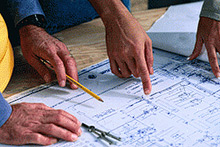Guidebook, Step Six: Dealing With Contractors

Working successfully with your contractor is all about cooperation.
Step six of the design process addresses working well with your general contractor. A good working relationship with your kitchen renovation contractor can be the factor that determines the success of your project. Here are seven key tips for creating and maintaining a harmonious partnership.
Choose someone who says, "We do that every day."
Kitchens present unique challenges, touching on every complex component of a house - water, electricity, gas, HVAC, and more. Seek out a contractor who is experienced with kitchen renovations that look a lot like yours. Expansive space filled with exotic finishes? Pick the contractor with a portfolio full of similar homes. Small galley kitchen? Find someone accustomed to working within tight quarters. Ideally, your contractor will have experience working in your part of town and on your vintage of home.
There's something to be said for looking beyond the dollar signs.
Numbers matter, but the big picture matters more.
Is the lowest bid on your renovation project from a contractor with an abrasive personality? Does the highly recommended firm bring along a higher price tag? While it isn't true that the lowest bid will always result in lower quality work, there is something to be said for looking beyond the dollar signs when making a hiring decision. If complications should arise during the kitchen renovation, the contractor with the lowest bid may have little or no "wiggle room" to absorb the increased costs. When everything is said and done, you may realize negligible savings.
The success of your kitchen renovation hinges on many factors, and a good relationship with your contractor is high on that list. Finding a team that you can feel comfortable speaking to and collaborating with goes a long way to ensuring a smooth project. When in doubt, go with your gut to pick the contractor that feels right for your project.
Do your homework.
Chances are that you found your contractor through a referral - either from your kitchen designer or a friend. While the experience of trusted sources can be a great starting point, you should still do a little research to feel confident moving forward with a firm.
Reach out to the Better Business Bureau to see if there are any outstanding complaints from past clients. Check with the local Chamber of Commerce, too. Online review services like Yelp, Angie's List, and HomeAdvisor may or may not have entries for your prospective contractor; it's worth your time to run a search or two.
Renovations are dirty work, but a job site should be organized.
If you aren't familiar with which licenses and permits a contractor will need to do work in your area, check with your city. Verify that your prospective contractor is duly licensed for the project. Also verify that the contractor carries appropriate insurance for this type of project. Reputable firms should be able to quickly provide you with verification.
Finally, speak to former clients and visit an active job site. Does the project seem to be running smoothly? Is the job site orderly and neat or a chaotic mess? Renovations are dirty work, but a job site should be organized, the mess should be contained, and the workers should be respectful of working in someone's home.
Review bids and contracts knowing that plans can change.
The more detailed a contractor's bid, the better. Ask for an itemized bid if possible. This will help you to better understand where your money will be going and how later changes could impact the overall project cost.
Your contract should clearly explain anticipated start and end dates, costs, and which items are being installed, and provide schematics illustrating the work to be completed. If you haven't selected every item for the project, use allowances to provide an "up-to" price for a given item.
A comprehensive contract will give you and your contractor a solid foundation for your working relationship. As plans change - whether due to design alterations or unanticipated complications - you can collaborate to revise the contract accordingly, with the knowledge that both parties are being treated fairly.
You're hiring more than an individual.
Remember that your contractor isn't the only person you're hiring. He or she will most likely bring along a team of people - electricians, plumbers, painters, carpenters - who will be performing much of the work in your kitchen. For larger firms, you may be working most closely with a job site supervisor other than the general contractor.
This isn't necessarily a bad thing. In most cases, you will be better served by having specialists working on complicated projects like moving plumbing or rewiring outlets. But it does mean that you will be interacting with a larger group of people than you may have anticipated.
While interviewing your contractor, be sure to ask about who will be performing the work. Do some research on any subcontractors. Contractors often have relationships with multiple subs, so if you notice any red flags when researching their work, you can request that a different subcontractor be hired for your project. If your contractor will be bringing in a job site supervisor, request an appointment with him or her to make certain that your personalities mesh. Remember that this person will be your day-to-day contact for scheduling, complications, and complaints.
Know your responsibilities.
While many contractors will do their best to minimize your involvement with the project, there are certain tasks that are best assigned to you and your family. For example, workers may be disinclined to move delicate furniture or electronics in the project area. Tasks like emptying out cupboards and shelving is best left to you, as you can keep things organized for easy access during the renovation. Be sure to discuss any furniture that he or she expects you to rearrange. Furniture moving specialists might be the best option.
Set some rules of the house.
Does your HOA have rules about where contractors can park? Are you concerned about workers showing up at the crack of dawn? Do you have a dog that likes to run away if the front door is left open?
It's your responsibility to clearly communicate your expectations.
While any reputable contractor and crew will be courteous and polite, it's your responsibility to clearly communicate your expectations and any restrictions that your neighborhood may impose on renovation work. Experienced contractors are very familiar with noise ordinances, time restrictions, and minimizing the mess they create while working inside of a home. Take time to think through any issues that might crop up so that you and your contractor can plan ahead. Restricted working hours can impact the cost of labor, so it's critical that these be communicated before the contract is finalized.
Spend a little time thinking about how you will live in your house while the work is underway. For example, you may want to keep pets confined in another part of the house to avoid escapes and the dreaded dog-in-the-paint-can scenario. Kitchen renovations can take up a lot of space - those new cabinets, old cabinets, appliances, and everything inside the cabinets have to go somewhere. Your kitchen designer or contractor may be able to warehouse the new cabinets prior to installation, but start thinking now about what you can pack away and what will need to remain accessible. You may have to surrender your garage space during the project as an extra holding area. Brainstorm with your contractor, as he or she will have a good handle on how much space they will need during the various phases of the project.
Collaborating with a reputable contractor and his or her team should be an easy, positive experience. Following these seven tips will go a long way to ensuring that you and your contractor get started on the right foot and can continue without stumbling.

